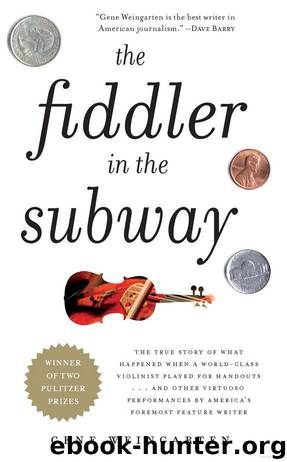The Fiddler in the Subway by Gene Weingarten

Author:Gene Weingarten
Language: eng
Format: mobi, epub
Publisher: Simon & Schuster
Published: 2010-10-16T21:00:00+00:00
Life is possible only with illusions. And so, the question for the science of mental health must become an absolutely new and revolutionary one, yet one that reflects the essence of the human condition: On what level of illusion does one live?
—Ernest Becker, The Denial of Death
IF THERE WAS anxiety, it was not apparent on the faces of the people on this double-decker commuter train that brings workers into Madrid from the blue-collar northeastern suburbs. People dressed for work sat quietly, in that state of swaying, hypnotic detachment familiar to subway riders everywhere. Some glanced at the time and temperature, which flashes continually in these trains on a dot-video display. But no one seemed to be noticing a large hiker’s knapsack, left unattended. It was getting stares only from me, and only I bothered to nudge awake a dozing man across the aisle, to ask if it was his. It was.
Of course, most of these people had ridden here fifty times since the day that this very train—same destination, same time of day—exploded. That was ten weeks before, March 11, one of four bombings that occurred almost simultaneously, in different rush-hour trains, along the forty-minute commuter line. The instruments of destruction were backpacks detonated by cell phone. Al Qaeda masterminded it; Spain was said to be a target because of its cooperation in the war in Iraq.
This train took the worst hit, multiple bombs detonating a minute before it was to roll into the giant Atocha station—Madrid’s version of Grand Central. Dozens of people died in unspeakable ways. When some survivors tried to describe for TV crews what they had witnessed, they began, but fell grimly silent.
On this day, on this train ten weeks later, there was nothing. Soldiers with assault rifles had been very much in evidence at the park-and-ride suburban station of Alcalá de Henares, where I had boarded. Alcalá was where most of the terrorists were thought to have entered the system with their deadly cargo.
But the train itself held only commuters, staring blankly ahead as they passed through gray industrial parks, clotheslined shantytowns with rusted corrugated-metal roofs, and the familiar New York–style graffiti that turned rocks into gaily spray-painted monogrammed pastel pillows. For many people on 3/11, this was the last sight they ever saw.
The train I was on was now standing room only. As we neared Atocha and the display time hit 7:39—the moment of the bombing—I approached a small, trim woman in her forties and asked her if she was nervous. Celia Alves, a secretary, was headed for work. Nervous? She shrugged no, and nodded disgustedly toward the newspaper I was carrying. It was that day’s El Pais; I had picked it up at the station but hadn’t yet looked at it.
“Obtuvieron lo que desearon,” she said. They got what they wanted.
This was May 25. The headline read “Los Últimos de Irak.” It reported that the final group of Spanish advisers had returned from Iraq. The troops had been ordered home by Spain’s new antiwar government, elected in a backlash after the bombings.
Download
This site does not store any files on its server. We only index and link to content provided by other sites. Please contact the content providers to delete copyright contents if any and email us, we'll remove relevant links or contents immediately.
Asking the Right Questions: A Guide to Critical Thinking by M. Neil Browne & Stuart M. Keeley(5775)
Autoboyography by Christina Lauren(5235)
Eat That Frog! by Brian Tracy(4542)
Dialogue by Robert McKee(4405)
Sticky Fingers by Joe Hagan(4202)
Journeys Out of the Body by Robert Monroe(3625)
Annapurna by Maurice Herzog(3470)
Full Circle by Michael Palin(3450)
Schaum's Quick Guide to Writing Great Short Stories by Margaret Lucke(3381)
Elements of Style 2017 by Richard De A'Morelli(3350)
The Art of Dramatic Writing: Its Basis in the Creative Interpretation of Human Motives by Egri Lajos(3069)
Atlas Obscura by Joshua Foer(2963)
Why I Write by George Orwell(2955)
The Fight by Norman Mailer(2943)
The Diviners by Libba Bray(2939)
In Patagonia by Bruce Chatwin(2932)
The Mental Game of Writing: How to Overcome Obstacles, Stay Creative and Productive, and Free Your Mind for Success by James Scott Bell(2909)
Venice by Jan Morris(2575)
The Elements of Style by William Strunk and E. B. White(2475)
